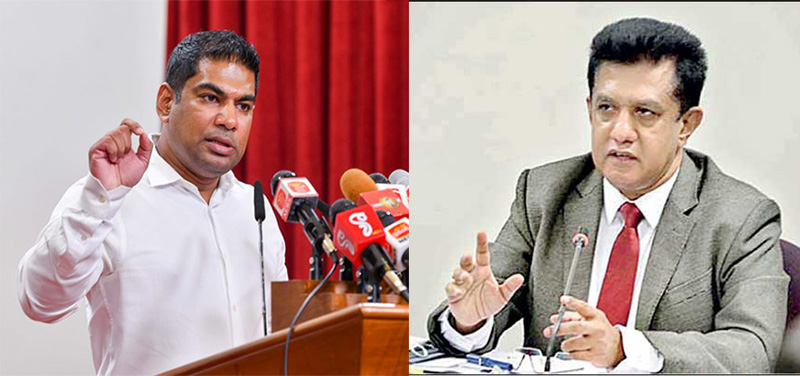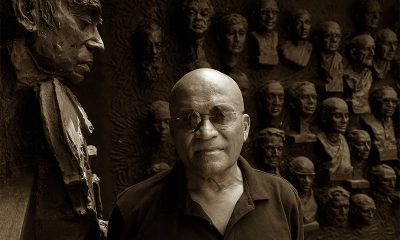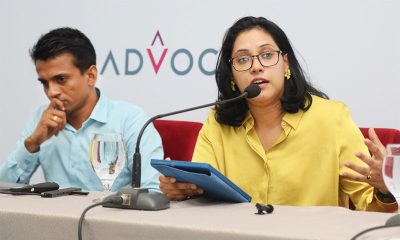Opinion
Land rackets and legal fraternity

On joining the prestigious legal profession, in Sri Lanka, an attorney-at-law has certain obligations and responsibilities to their clients and the country. As Dr A. R. B. Amarasinghe in his book, “Professional Ethics and Responsibilities of Lawyers”, points out, “a lawyer has many obligations. He has a duty to the client, to the court and to other tribunals and bodies. As an officer of the court, he must act with honesty, integrity and candour. Any duties or directions made by the court must be fulfilled, including any matter regarding which he has given an undertaking to the court. His foremost duties to his clients require him to act with due skill and diligence and reasonable swiftness and courtesy while maintaining his clients’ confidence and avoiding conflict of interests. A lawyer has an obligation to demonstrate ethical practice to the public, including his peers.”
In 1979, I designed a house for Prof. Ediriweera Sarachchandra at Epitamulla Road, Pita Kotte. During this process, he informed me that there was land available for sale on the opposite side of the road. As I had been looking for suitable land, I ventured to buy it. I could not afford to build at the time but constructed a retaining wall and fence along the boundary to secure it. Even though I visited the place off and on, nothing was built on the land. Neighbours are excellent and kind enough to take care of the property. All these years, we did not have any problem.
In 2016, my daughter was interested in constructing a house and was looking for land. I offered her the land at Epitamulla Road. As she was interested, I proceeded to install a proper gate and redid the boundary fence that had deteriorated. I gifted the land to my daughter. A young, efficient attorney prepared the deeds on behalf of my daughter with life interest on the property retained in my name as a precautionary measure. It also helped to maintain the pedigree of the land from the original purchase. I proceeded to the Land Registry at Battaramulla, interviewed the lady in charge, and inquired about registering the land. There was a delay, and subsequently, the process was completed.
A false deed registration, registered from Matara, claiming ownership to the land appeared within a week of going to the Land Registry. The claimant said that the land belonged to him, a case was filed against him. He is currently absconding. But judgement has been issued.
In the meantime, it seems that the land was sold many times in quick succession. One person who allegedly bought it cut the two jack trees and the kitul tree, while another buyer brought in heavy equipment and filled the land that sloped to the water edge of the lake. In the process, he broke the gate post and the gate. While this was going on, I placed nine police entries recording what was happening in sequential order. These complaints were made to the Mirihana Police Station, as Epitamulla Road comes under its jurisdiction. The gate post and gate were hurriedly repaired in one night.
The land was being hawked around and offered to different Finance companies and possible genuine buyers. Many to whom the land was offered to, through friends, contacted me, and on being informed that the deeds were fraudulent and that we had not sold the land and they should not get caught in the fraud, they quickly withdrew. Some still ring me, thanking me for saving them.
In the meanwhile, others were busy preparing the second set of false deeds and documents. This time the documents included a false deed prepared and attested by Attorneys, a National Identity Card issued in my daughter’s name with a photograph of some strange woman, a death certificate issued in Kuruvita, Ratnapura District, in my name and a signed affidavit that the life interest holder was dead. The documentation looked authentic. The seller was pushing for the conclusion of the sale. The sale had been almost concluded on this false deed. However, a family member of the buyer and his lawyer were suspicious and informed the Mirihana Police. All involved, that is, all the players who were getting a share from the proceeds of the sale, were arrested. We were called to the Mirihana Police Station and requested to make statements. We stated that we had not sold the land, and this was recorded. There was a lull for some time.
A couple of months later, two new false deeds appeared. This was more serious. One false deed stated that my daughter had sold the land to one Mr Perera, and another false deed was issued in the new owner’s name. As there was a life interest on the property, there was also a second death certificate, which this time was issued in Colombo, stating that I had died and was buried at the Galkissa Cemetery.
With this documentation, the land was sold to a finance company. Within a week, the owner of the finance company, who had met me previously through his family contacts, enquired if I had sold the land when informed that I was still alive. On being informed that I had not sold the land, he immediately informed the CID. He was hell-bent on getting his money back.
The CID was on the ball. They quickly collected copies of all four false deeds and the names of the Attorneys who had signed the deeds, copies of the two death certificates and the false Identity card. The CID also collected copies of all the five original deeds lodged with us. They also recorded statements from all involved with the original deeds. The heat was such that the owner of the finance company got his money back.
Subsequently, the property, with the false deed and documentation was sold again to an insurance company that placed their name on the gate. The insurance company has since offered the property for sale in the usual manner. Many who were offered it informed us, and after they heard our story, they withdrew. But the insurance company continued to push for its sale. We were informed that some individual had brought in heavy equipment and cleaned the property. I lodged a complaint at the Mirihana Police that an unknown individual was cleaning my property.
At the end of August 2021, we received an anonymous letter with information giving the names of persons, one Mr. Perera, who is involved in the possible preparation of another fraudulent deed. This letter as well has been handed over to our lawyers.
It is difficult to comprehend how members of the legal profession, members who are duty bound to protect the rights of the citizens of this country, are so easily convinced and willing to compromise and demean themselves and their ethics to indulge in the initiation and preparation of false deeds and support the falsification of legal documents, which I understand is a serious offence. It is disconcerting that these individuals are willing to compromise themselves, their responsibility and professional ethics to stoop to such low levels to cheat the general public and be so desperate to earn a fee.
It is also unfortunate that members of the legal brotherhood are willing to certify the forged documents as authentic without proper research into the pedigree of the deeds. They seem to be ever ready to take the documents at face value and even recommend them to potential buyers, their innocent clients who have placed their trust and faith in their better judgement that the documents are in order.
It is also a bad reflection on the officers in different important government departments which may be willing to issue collaborative documents, like death certificates, on false requests, and even going as far as issuing false national Identity cards to different persons for a fee. Surely, the Sri Lanka administrative service has not reached down to such a low level. However, these documents may also be forgeries. The officers in the land registry, covering the Epitamulla area and the Kotte Municipal Council, should not register false documents, at face value. They should insist on some authenticated documentation of the real ownership of the property.
We have been notified that brokers are going around trying to sell this property. We have not engaged any brokers. We are informing the general public to please note that we have not sold the above-mentioned property to anyone. We still hold the original title. There have been many efforts to change the status by using numerous forged deeds and false supporting documents to pressure the authorising authorities to collaborate.
Let the general public be warned against the purchase of this property at 48/57, Epitamulla Road currently 128/5, Ediriweera Sarachchandra Mawatha
, Kotte as all the documentation used to sell the property is fraudulent. The deeds shown and paraded around are all false deeds and documents. Please do not get caught. The Criminal Investigation Department may be busy, but they have all the information needed. The CID has the names of all the people involved and the names of all the members of the legal brotherhood involved in preparing these false deeds. They have already interviewed several people. We are confident that the CID will soon do their job in the usual efficient manner. All the original deeds and copies of the false deeds and related documentation are lodged with Romesh de Silva, PC.
This land adjacent to the Diyawanna Oya is not for sale. We are still interested in developing it for our use. We recommend that all parents who give property to their children introduce a life interest clause, making it more complicated for unscrupulous individuals to intrude on your privacy, as two persons have to agree to sell this land.
Ashley de Vos
Opinion
Observations on Electricity Bill

Prof. Charitha Herath’s letter to Minister of Power and Energy Kanchana Wijesekera
Having reviewed the recently published Sri Lanka Electricity Bill in the gazette, I wish to express my appreciation for the improvements made compared to previous drafts. It’s evident that considerable effort has been invested in refining this version of the bill, making it notably more comprehensive and effective.
Nevertheless, I have identified some fundamental issues in this draft as well. I believe that the forthcoming discussions on this draft will provide an opportunity to address these concerns. Given that the drafting committee appears to have finalized their positions on the matter, I suggest that the proposed changes to the bill should be subjected to scrutiny first in the Supreme Court and subsequently in the Parliament. I anticipate that certain comments and issues regarding the bill will be raised during the legal submission to the courts and in the policymaking exercise within the Parliament.
In the meantime, I wanted to share some of the issues I’ve noticed at the forefront of the bill with you. I believe your consideration, as the incumbent Minister of Power and Energy, is crucial regarding these matters. Thus, I aim to bring these issues into the national discussion surrounding this significant legislative process.
Reforms are Needed
As many would concur, I share the belief that reforms in the Power and Energy sector are paramount. This necessity has been a focal point in policy-level discussions over the past two decades. The current regulations governing the Power Sector, established under the Ceylon Electricity Board Act No. 17 of 1969 and the Electricity Act No. 20 of 2009, have highlighted numerous lapses and legal complexities. These issues have resulted in delays and, in some cases, hindered the development within the sector.
In my view, the reform requirement mentioned above was not adequately addressed by the gazetted bill on 17/4/2024. Instead, it appears to provide excessive leeway for political actors to intervene in the regulatory mechanism of the Power sector. In essence, the proposed bill could exacerbate existing difficulties in certain areas and potentially delegate decision-making power entirely to political entities.
When examining international experiences, Power sector reforms typically unfold in three stages:
1. Unbundling and corporatization, often adopting a single buyer model.
2. Establishment of a wholesale market.
3. Establishment of a retail market.
These stages represent a structured approach to reform aimed at enhancing efficiency and promoting competition within the sector.
The overarching goal of reform experiences is to transform initially highly regulated existing markets, where the regulator decides on allowed Revenue and Returns of Investment (ROI) except Power Purchasing Agreements (PPAs). Consequently, reforms typically advance towards deregulation, wherein prices are determined through competition. This progression aims to foster greater market efficiency and encourage innovation within the sector.
The gazetted Bill, dated 18/04/2024, outlines an initial proposal for unbundling and corporatization, operating within a single buyer model. Under this framework, the National System Operator (NSO) is tasked with purchasing electricity from Generation Companies (Gencos) and subsequently selling it to Distribution Companies (Discos). Additionally, the bill aims to establish a wholesale market model, wherein prices are determined through competition between Gencos and Discos. This approach signifies a pivotal step towards fostering market efficiency and promoting competition within the sector.
Given that approximately 85% of the cost of electricity in Sri Lanka is attributed to generation, it is imperative to prioritize the establishment of competition within the generation sector. Therefore, in alignment with the overarching reform expectations, it is crucial to thoroughly examine the gazetted bill. This careful scrutiny will ensure that the proposed reforms effectively address the need for competition in the generation sector, ultimately contributing to greater efficiency and affordability in the electricity market.
Some Observations
·
In order to effectively implement new reforms in the Power sector, there are two crucial aspects to consider at a conceptual level. Firstly, it is imperative to consult and involve the main stakeholders of the industry in the proposed legal and institutional reforms. It is essential to ensure that their voices are heard and that they are actively engaged in the process, regardless of whether all stakeholders are in agreement with the Bill. Secondly, it is vital to ensure that the proposed reforms adequately address the core issues at hand. Unfortunately, it is my belief that the Government has failed to address both of these highly important issues.
· The proposed bill signifies a notable shift towards increased Politicization of the Electricity Sector. It is clear that key institutions to be established under this bill will be subject to substantial political influence. For example, following the bill’s passage, entities like the Long Term Generation Expansion Plan (LTGEP), National System Operator (NSO), Power Sector Reform Secretariat (PSRS), and certain functions of the Public Utilities Commission of Sri Lanka (PUCSL) will come under direct political control.
· The independence of successor companies and corporate good governance will no longer be maintained, as management control will now rest with the Minister in Charge.
· The Electricity Reform Act no 28 of 2002(that was not implemented due to political reasons)had proposed the establishment of an independent agency known as the “Monitoring and Advisory Committee” to spearhead the reform project. This committee was intended to have the authority to advise the Minister on the appointment and dismissal of directors of the proposed successor companies. However, the recently gazetted new Bill (17/04/2024) does not include this independent mechanism, giving the Minister the power to appoint the Board of Directors of the successor companies. Furthermore, the Minister’s consent is now required for the appointment of the CEO of NSO, as outlined in Section 10 (1)(b) & (c) of the new Bill.
· The “Long Term Power System Development Plan” is formulated by NSO and then forwarded to the Minister for assessment, followed by submission to the Cabinet for approval (as outlined in the recently gazetted Bill, Section 10 (7) (b)).
· Weakening of the Regulator, PUCSL
· The PUCSL no longer holds the power to approve the “Long Term Power System Development Plan” as it has been transferred to the cabinet of Ministers, as per the newly gazetted Bill, Section 10 (7) (b).
· According to Section 3(1)(a) of the Sri Lanka Electricity Act 2009, the PUCSL has the authority to provide advice to the government on matters within their jurisdiction. Nevertheless, the recently gazetted Bill has revoked these powers and transferred them to the National Electricity Advisory Council, which will be appointed by the Minister (new Bill, Section 3 (3)).
· According to Section 20 (2) of the Bill that was gazetted in December 2023, the Regulator is required to simply “inform the Minister” when granting licenses for generation, transmission, and distribution. However, in the recently gazetted Bill, the Regulator now needs to seek the “concurrence of the Minister” before granting licenses.
· The Bill’s Section 4 (10) includes provisions that enable the bypassing of competitive tendering through the provision of incentives to select technologies.
· Illogical Timeline – proposed approach to rescind the current Acts in 6 months without any preconditions, unveiling the Transfer Plan after the specified date, and more.
· As per the new Act, the functions currently executed by CEB will be transferred to the newly formed successor companies within a maximum duration of six months. Section 1 (2) of the Act ensures automatic appointment within this timeframe.
· The process of setting up new successor companies includes drafting detailed Memorandums and Articles of Associations, reallocating assets, liabilities, and human resources, preparing new balance sheets, creating financial models for tariff development, and finalizing the incorporation of other supporting functions. The unrealistic timeline proposed in this new Act is a significant issue.
·It’s not just the impracticality, the legality of forming companies according to a transfer plan which has not been approved and gazetted is also another serious issue.
·Electricity Pricing – guaranteeing fair returns, measures to establish private monopolies, minister directs policy guidelines to encourage specific projects/technologies, no safeguards for regional trade below domestic market prices, permitting current generation licensees to engage with distribution licensees before entering the Wholesale market.
· The increase in electricity prices is tied to the requirement for a justifiable return on investment as outlined in the recently published Bill, Section 29 (5) and (9)(a). This will cause prices to rise, with the Regulator being legally required to ensure that profits are kept at a reasonable level. In times of high inflation or interest rates, electricity prices may see an uptick. The assurance of a reasonable ROI can be accomplished through tariff policies, which are not legally mandated, giving the Regulator the ability to lower profits during tough economic times.
·Granting free access and allowing Captive Generation without comprehensive study as stipulated under Section 12 could lead to the general public being unable to access cost-effective power plants, ultimately causing prices to escalate.
· Section 30(4) permits distribution licensees to engage in power purchase agreements with generation licensees before the Wholesale Electricity Market is established. The competition between distribution licensees for access to inexpensive power plants will drive up prices.
· In the December 2023 gazetted Bill, there was a provision that prohibited the acquisition of combinations of licenses without any qualifications (Section 19 (6)). However, in the new Bill, this prohibition only applies if a company owns more than 50% of the ownership. For instance, if a company owns 49% of the National Network service provider, it can still acquire a Distribution license and shares of multiple other companies as long as its ownership remains below 50%. Additionally, with the introduction of Additional Transmission Licenses, it is possible for a few companies to have control over more than 50% of the National Grid.
· Private companies have been granted Additional Transmission Licences under the new Bill, as stated in Section 14 (2). Nevertheless, Section 10 does not grant the NSO the authority to utilize transmission lines owned by these Additional Transmission Licensees in order to ensure a consistent electricity supply.
· The new Act does not include any provisions to address monopolies, anti-competitive practices, collusion, abuses of dominant position, and merger situations that could impact competition in the Electricity Industry. Rather than enacting specific laws to combat these issues, Section 28 grants the Minister the authority to issue policy guidelines.
· Additionally, as per Section 10(13)(b), it is stipulated that the terms of Electricity trading with foreign nations must receive approval from the Cabinet of Ministers. Given that this trading has a direct impact on the sovereignty of the nation, these terms should be ratified by Parliament, especially for fundamental conditions.
· The exportation of low-cost renewable energy to other countries may result in the deprivation of citizens from accessing affordable electricity. Regional trading lacks protection against prices below the local market costs.
As mentioned earlier, stakeholders and policymakers will have limited avenues for correcting the draft bill once it has been gazetted and tabled in parliament. One option is to seek determinations from the Supreme Court, while the other is to propose amendments during the Committee Stage of the parliamentary debate. However, given the current government’s approach to passing acts in parliament, there are doubts about the feasibility of making amendments through the parliamentary process. The considerable majority power of SLPP MPs is likely to heavily influence and potentially override discussions on the issue within parliament.
I urge the Honourable Minister to carefully consider the observations outlined above and take necessary steps to amend the bill accordingly from the government side. Furthermore, I strongly encourage the Honourable Minister to convey these observations to your advisory council for their expert input and recommendations in rectifying the identified issues. This proactive approach will ensure that the bill is revised comprehensively to address concerns and uphold the principles of fairness and effectiveness in the reform process.
Lastly, I would like to reference an important excerpt from Sally Hunt’s influential book, “Making Competition Work” (2002), which directly relates to the subject under discussion here: “In the US energy industry, it is fairly clear that the major problems with the old structure lay in the generation part of the industry – the efficiency of the investment decision, its regulation, and the tendency for decisions on generation to become politicised” (p. 28).
What I have observed throughout the process of drafting the new Electricity Act is a concerning trend towards politicization of decisions regarding generation. I strongly urge you to take decisive steps to halt this trend and address the issues present in the bill accordingly. It is imperative that we uphold the integrity of the legislative process and prioritize the best interests of the public and the energy sector as a whole.
Charitha Herath (MP)
Opinion
My aviation mystery

By Dr Upul Wijayawardhana
Before I get to the worst experience in my air travels, I need to mention that much has happened since I wrote “Biggest mysteries in aviation history” (The Island, 22 March) which concluded with the following:
“Ten million passengers take to air each day and air travel has become the safest mode of transport but some recent incidents involving Boeing have made dents in public confidence as some are accusing Boeing of putting profits before safety. Hope it is not true!”
Based on this comment, Guwan Seeya had written an excellent piece “Truth about air safety” (The Island, 8 April) which was very revealing and concerning, as he ends his piece with: “Yes, it is a mercenary world and we are all walking on thin ice.” Considering the detailed analysis, it is pretty obvious that Guwan Seeya is an experienced pilot, most likely retired as he calls himself Seeya, who is an air-crash investigator and what he states should be taken very seriously. May I thank him wholeheartedly for the excellent information which has further evinced my interest in aviation safety.
In the practice of my profession, medicine, very quick decisions have to be made, just like in aviation, and sometimes we get things wrong. In UK, we do regular audits and review deaths so that we may improve practice by learning lessons from mistakes and have always looked up to air-crash investigations as the model to follow but even that can be improved, as pointed out by Guwan Seeya. He faults the US Federal Aviation administration (FAA) for being reactive than proactive, the most telling line in his piece being “Pilots always say there has to be blood on the runway for changes to happen!”
Boeing, once a byword for safety, has lately suffered from safety issues as it seems to have put profits first, as alluded to in my piece. It has had a downhill course since the merger in 1997 with McDonnel Douglas, ill-advised according to critics, culminating in 737Max disasters. Attempts were made to blame the pilots for the problems with the ‘Manoeuvring Characteristics Augmentation System’ resulting in the fatal crashes of Indonesia’s Lion Air and Ethiopian Airlines but Boeing had to finally admit responsibility.
Not putting bolts in a door plug, making it fly away from an Alaskan Airlines 737Max flight, however, was the turning point leading to two inquiries by the US senate where devastating evidence had been given by whistleblowers. More worryingly, one of them died of gun-shot injuries; supposed to be a suicide but some doubt whether it is so! Most of the top executives have been sacked or decided to step down and do hope a safer era of aviation would dawn. Till then, some concerned passengers may decide to opt for Airbus flights. There is some hope for SriLankan Airlines!
I have enjoyed flying and the only regret in my life is not being able to get time-off from my professional duties to obtain a private pilot’s licence. Even the warnings from Guwan Seeya is unlikely to put me off from flying! My first long-haul flight to London in 1969 was on a Vicker’s VC10, leased to Air Ceylon from BOAC and well remember rehearsing for it by taking a Colombo/Trincomalee flight, paying for it by using the first-class railway warrant!
Since then, I have been fortunate to fly all over the world on many airlines, some now extinct, meeting every eventuality except an air-crash or hijack. Our flag carrier was Air Ceylon from 1947 to 1978 and it had the distinction of never having had a major disaster. Air Lanka, which took over from Air Ceylon in September 1979 was not so lucky, one of its’ Lockheed Tristar’s being blown to two pieces by a Tiger bomb on 3rd May 1986 in BIA.
The bomb planted in the cargo hold was meant to detonate mid-air but it was fortunate that the flight was delayed resulting in the loss of only 14 lives. It was re-branded in 1998 as SriLankan Airlines and a pre-dawn raid by Tigers on 24th July 2001 resulted in the total loss of two Airbus A330 and one each of A340 and A320 aircraft.
“Ladies and gentlemen! This is the captain speaking. I am sorry to inform you that we have to make an unscheduled diversion to Bombay airport” I was woken up from a slumber by this unexpected announcement in the Air Lanka Tristar night flight headed to Dubai. I cannot remember the exact date but it was late 1986 and I was on my way to London, accompanying my good friend Dr Nihal Perera for cardiac investigations with a view to surgery. Though I am usually awake when I accompany a patient, I dozed -off after the heavy meal as Nihal’s wife Rani, who was seated just behind us, told me she would wake me up if there was any problem.
As I was a frequent traveller, many of the staff knew me and I had the occasional privilege of sitting in the cockpit too, being in the times before restrictions were introduced. I quietly approached the chief purser who confided in me that the diversion was due to a bomb-threat. When we landed in Bombay airport, I noticed the entire surroundings of the runway cleared and our flight was directed to a corner where a number of ambulances and fire-trucks were awaiting our arrival, with flashing lights! It was only then I told Nihal, whom we affectionately referred to as Seba, what the problem was and whispered “Seba, we can not wait for a wheel chair in the face of this threat. Shall we walk slowly to the terminal?” Fearing for dear life, he agreed and we hurried up with no problems, fortunately.
We were in Bombay for almost twelve hours, emplaning and getting out, at least five times as there were a number of minor irregularities. Different authorities involved made repeated checks and no bomb was found. Waiting in the then primitive Bombay airport and the apprehension was intolerable, to say the least, but were relieved when the captain made an announcement on the sixth occasion we emplaned “Ladies and Gentleman, Extremely sorry for the delay and we will be leaving shortly though the officials now say that they have overlooked searching the perishable cargo. I have decided to dump the perishable cargo, though it is worth about 15,000 British Pounds, as I do not want to inconvenience you any longer”. Deservedly, he got a thundering applause. It is so bad of me not to remember the name of that captain!
We arrived in London, exhausted and 12 hours late but Nihal was able to have tests a day later and successful surgery thereafter. He survived not only a heart attack but also this ordeal to become the President of SLMA in 1988.
Obviously, this was a hoax telephone call and extremely unlikely Tigers were behind as they mean business. I searched the website of the Department of Civil Aviation and this incident is not recorded, at all! I wonder whether Air Lanka investigated the source of the call.
This was the time GMOA was agitating for a division of the Cardiology Unit and hurling mud at me, every turn. Just imagine if Nihal got adversely affected by this hoax. My reputation would be in tatters!
What is intriguing was a news item I spotted on the front page of the early edition of the Daily News, handed to us by the cabin crew, as we sat down after emplaning in BIA. It was titled “Dr Upul Wijayawardhana off to London” and continued to say that I was accompanying Dr Nihal Perera for treatment. When I showed this to Nihal and Rani, they were as surprised as I was as neither I, nor them, had informed anyone of the visit, let alone the press! Anyway, is it newsworthy? Why was Nihal’s privacy not respected? Who gave the information and was the hoax call connected?
I can only guess but mystery remains!
Opinion
An exemplary officer of the Colombo Municipal Council

We all die one day and for those of us living within the municipality of Colombo, the chances are that we will be cremated or buried in the main cemetery of Colombo, the Borella Kanatte cemetery.
This famous institution is headed by a cemetery manager and a host of workers who are by the very nature of their work an essential part of the functioning of the city of Colombo. Every city has to dispose of their dead citizens in a respectable and dignified manner and the Kanatte institution is therefore an important part of the “life” of the city.
The cemetery manager who is directly under the Chief Medical Officer of the Colombo Municipality has a role to play with all the relatives and dear ones of deceased persons, and can make a funeral a “pleasant” or an unbearable experience. He is the one together with the funeral undertaker who makes the funeral function normally.
The case I am writing about is my and my family’s interaction with the manager, a new one, in a somewhat complicated procedure we as a family had to undergo, as this had to do with an exhumation, a cremation and a deposition of ashes.
Our eldest son died on May 8, 2018 in Buttala, under unknown circumstances after a lunch meal with a friend from Sweden who was visiting him.
Our son who was a bachelor lived alone on his own land in Buttala together with a caretaker and his family who looked after the agricultural side when he was not in Buttala.
We, his father and mother had journeyed to Sweden and had been there only for four days when we were informed of his untimely death. We then, together with his younger brother who lived in London, journeyed back to Sri Lanka in order to take care of this very sad event.
Since the postmortem could not definitely identify what had caused his death except for some extraneous substances found in his stomach, the coroner ruled that he should be buried at least for three years, and if necessary cremated thereafter giving time for any unexpected findings in a legal context in the meantime.
Our son whose body was brought to Colombo was then duly buried in the Anglican section of the Kanatte Cemetery on May 12, 2018 in a temporary grave.
Three years passed and in 2021 during the pandemic we took up the case for an exhumation and cremation and deposition of his ashes in our family grave in the Buddhist section of the cemetery. This involved a legal procedure in the Courts of Colombo which was done by a firm of lawyers to get official permission for the exhumation etc and also entailed the help of the Municipalty, their Chief Medical Officer and not least the Cemetery Manager of Kanatte.
This procedure in the Courts of Colombo sadly took three long years and we were given permission for the exhumation etc. I believe in October 2023.
Once the court order was ready we went with it to the Manager of the Cemetery where we were received with the utmost decorum and friendliness.
We were then told what to do, which included a funeral undertaker´s involvement in the transport of the remains to the crematorium etc. and their subsequent help in the collection of the ashes and finally the deposition in our family grave.
All this work was very smoothly done and thanks to a concerned and adept municipal officer, Mr. Herantha Jayawardane the Manager of the Kanatte Cemetery. All this work was done in just two days- the exhumation-the cremation- the collection of ashes and the deposition in our family grave.
I am glad that such officers are a part of our Municipality. Thank you Sir for all your help.
Vera Gamini Samarasinghe
-

 Business3 days ago
Business3 days agoCEAT Kelani launches three new radial tyre variants in ‘Orion Brawo’ range
-

 Midweek Review7 days ago
Midweek Review7 days agoBetween abstraction and empathy in Sarath Chandrajeewa’s visual paraphrases
-

 Business7 days ago
Business7 days agoSOEs seen as failing SL’s ordinary citizens
-

 Business5 days ago
Business5 days agoDialog-Airtel Lanka merger comes centre stage
-

 Business7 days ago
Business7 days agoSri Lanka Tourism concludes another round of Roadshows in Australia
-

 Business5 days ago
Business5 days agoSLFEA appoints JAT as a Facilitation Partner for training painters to provide overseas employment opportunities
-

 Business2 days ago
Business2 days agoCeyline Travels and MBA Alumni Association of University of Colombo sign MOU
-

 Business3 days ago
Business3 days agoHayleys Fabric celebrates triple triumph at ISPO Textrends Spring/Summer 2026



























